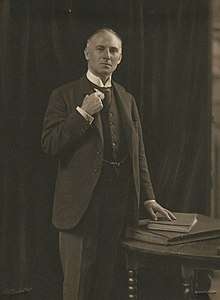James Avon Clyde, Lord Clyde
James Avon Clyde, Lord Clyde, KC, DL (14 November 1863 – 16 June 1944) was a Scottish politician and judge.
The Lord Clyde KC DL | |||||||||||||||||||||
|---|---|---|---|---|---|---|---|---|---|---|---|---|---|---|---|---|---|---|---|---|---|
 | |||||||||||||||||||||
| Lord Justice General | |||||||||||||||||||||
| In office 1 April 1920 – 1 April 1935 | |||||||||||||||||||||
| Preceded by | The Lord Strathclyde | ||||||||||||||||||||
| Succeeded by | The Lord Normand | ||||||||||||||||||||
| Lord Advocate | |||||||||||||||||||||
| In office December 1916 – January 1920 | |||||||||||||||||||||
| Preceded by | Robert Munro | ||||||||||||||||||||
| Succeeded by | Thomas Morison | ||||||||||||||||||||
| Solicitor General for Scotland | |||||||||||||||||||||
| In office October 1905 – December 1905 | |||||||||||||||||||||
| Preceded by | Edward Theodore Salvesen | ||||||||||||||||||||
| Succeeded by | Alexander Ure | ||||||||||||||||||||
| |||||||||||||||||||||
| Personal details | |||||||||||||||||||||
| Born | 14 November 1863 | ||||||||||||||||||||
| Died | 16 June 1944 (aged 80) Edinburgh, Scotland | ||||||||||||||||||||
Early life
Clyde was born on 14 November 1863, the son of Dr James Clyde LLD (1821-1912).[1] His father was Rector of the Dollar Academy and then of the Edinburgh Academy.[2]
He was educated at the Edinburgh Academy and at the University of Edinburgh, where he graduated with an MA 1884 and an LLB in 1888.[1]
Career
Clyde was called to the Scots Bar in 1889,[1] and by the times he was appointed a King's Counsel (KC) in August 1901,[3] he was the leading junior counsel in Scotland.[2] As a KC, he was retained by several railway companies and frequently appeared before the Law Lords.[2]
He was later Dean of the Faculty of Advocates from 1915–1918.[1]
He held office briefly as Solicitor General for Scotland from October 1905[4] to December 1905.[1]
He was the unsuccessful Tory candidate for Clackmannanshire and Kinross-shire in 1906.[5] He was elected at a by-election in May 1909 as the Liberal Unionist Member of Parliament (MP) for Edinburgh West, and held the seat until 1918.[6] He was Coalition Unionist member for Edinburgh North from 1918–1920.[2]
He was appointed a Privy Counsellor in December 1916.[7] He was also appointed to the Dardanelles Commission. He served as Lord Advocate from December 1916[8] to 1920 in Lloyd George's coalition government. He was appointed to the bench and served as Lord Justice General and Lord President of the Court of Session from 1920[9] to 1935, with the judicial title Lord Clyde. During this time Lord Clyde gave this famous quote (in taxation circles) in the case of Ayrshire Pullman Motor Services v Inland Revenue [1929] 14 Tax Case 754, at 763,764:[10]
"No man in the country is under the smallest obligation, moral or other, so to arrange his legal relations to his business or property as to enable the Inland Revenue to put the largest possible shovel in his stores. The Inland Revenue is not slow, and quite rightly, to take every advantage which is open to it under the Taxing Statutes for the purposes of depleting the taxpayer's pocket. And the taxpayer is in like manner entitled to be astute to prevent, so far as he honestly can, the depletion of his means by the Inland Revenue"
He was a Deputy Lieutenant of Kinross-shire,[1] and later became Lord Lieutenant of Kinross-shire from 1937 until his death. He was Chairman of the Trustees of the National Library of Scotland from 1936 to 1944.[2]
Personal life
In 1895 Clyde married Anna Margaret MacDiarmid.[1] They had two sons; the older, James Latham Clyde, later also became Lord Advocate and Lord Justice General.
Clyde died in Edinburgh on 16 June 1944.[2]
References
- Hesilridge, Arthur G. M. (ed.). Debrett's House of Commons and the Judicial Bench. London: Dean & Son. p. 354. Retrieved 11 January 2011 – via archive.org.
- "Obituary". The Times (Issue 49885). London. 17 June 1944. p. 6. Retrieved 11 January 2011 – via The Times Digital Archive.
- "No. 27346". The London Gazette. 16 August 1901. p. 5410.
- "No. 11770". The Edinburgh Gazette. 20 October 1905. p. 1001.
- Craig, F. W. S. (1989) [1974]. British parliamentary election results 1885–1918 (2nd ed.). Chichester: Parliamentary Research Services. p. 534. ISBN 0-900178-27-2.
- Craig, British parliamentary election results 1885–1918, page 500
- "No. 29875". The London Gazette. 22 December 1916. p. 12471.
- "No. 13026". The Edinburgh Gazette. 15 December 1916. p. 2348.
- "No. 13588". The Edinburgh Gazette. 20 April 1920. p. 1119.
- Martin Hagen, Tax Evasion or Legitimate... Accountancy Magazine November 2009
External links
- Hansard 1803–2005: contributions in Parliament by James Clyde
| Legal offices | ||
|---|---|---|
| Preceded by Edward Theodore Salvesen |
Solicitor General for Scotland 1905 |
Succeeded by Alexander Ure |
| Preceded by Robert Munro |
Lord Advocate 1916–1920 |
Succeeded by Thomas Brash Morison |
| Preceded by Lord Strathclyde |
Lord Justice General 1920–1935 |
Succeeded by Lord Normand |
| Honorary titles | ||
| Preceded by Sir Henry Purvis-Russell-Montgomery |
Lord Lieutenant of Kinross-shire 1937–1944 |
Succeeded by Henry Keith Purvis-Russell-Montgomery |
| Parliament of the United Kingdom | ||
| Preceded by Lewis McIver |
Member of Parliament for Edinburgh West 1909–1918 |
Succeeded by John Gordon Jameson |
| New constituency | Member of Parliament for Edinburgh North 1918–1920 |
Succeeded by Patrick Ford |